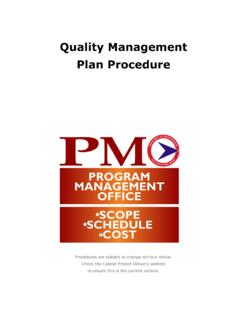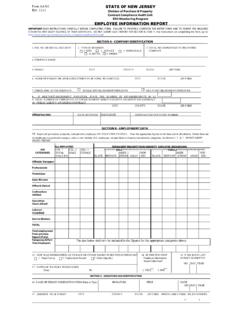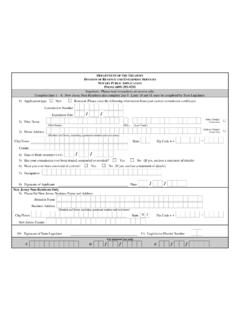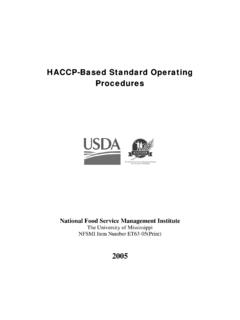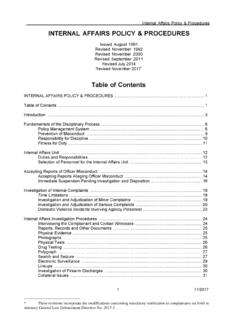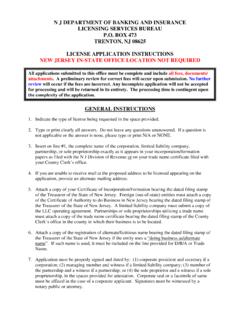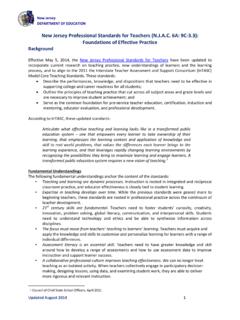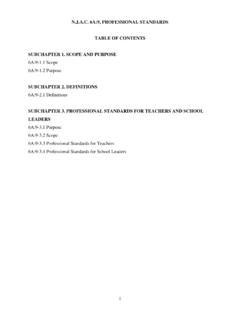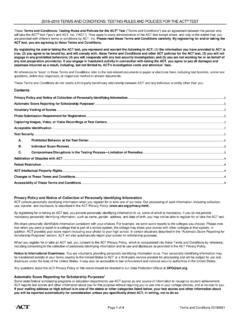Transcription of NEW JERSEY STATE POLICY PROHIBITING DISCRIMINATION …
1 NEW JERSEY STATE POLICY PROHIBITING DISCRIMINATION IN THE WORKPLACE I. POLICY a. Protected categories The STATE of New JERSEY is committed to providing every STATE employee and prospective STATE employee with a work environment free from prohibited DISCRIMINATION or harassment. Under this POLICY , forms of employment DISCRIMINATION or harassment based upon the following protected categories are prohibited and will not be tolerated: race, creed, color, national origin, nationality, ancestry, age, sex/gender (including pregnancy), marital status, civil union status, domestic partnership status, familial status, religion, affectional or sexual orientation, gender identity or expression, atypical hereditary cellular or blood trait, genetic information, liability for service in the Armed Forces of the United states , or disability. To achieve the goal of maintaining a work environment free from DISCRIMINATION and harassment, the STATE of New JERSEY strictly prohibits the conduct that is described in this POLICY .
2 This is a zero tolerance POLICY . This means that the STATE and its agencies reserve the right to take either disciplinary action, if appropriate, or other corrective action, to address any unacceptable conduct that violates this POLICY , regardless of whether the conduct satisfies the legal definition of DISCRIMINATION or harassment. b. Applicability prohibited DISCRIMINATION /harassment undermines the integrity of the employment relationship, compromises equal employment opportunity, debilitates morale and interferes with work productivity. Thus, this POLICY applies to all employees and applicants for employment in STATE departments, commissions, STATE colleges or universities, agencies, and authorities (hereafter referred to in this section as STATE agencies or STATE agency ). The STATE of New JERSEY will not tolerate harassment or DISCRIMINATION by anyone in the workplace including supervisors, co-workers, or persons doing business with the STATE .
3 This POLICY also applies to both conduct that occurs in the workplace and conduct that occurs at any location which can be reasonably regarded as an extension of the workplace (any field location, any off-site business-related social function, or any facility where STATE business is being conducted and discussed). This POLICY also applies to third party harassment. Third party harassment is unwelcome behavior involving any of the protected categories referred to in (a) above that is not directed at an individual but exists in the workplace and interferes with an individual s ability to do his or her job. Third party harassment based upon any of the aforementioned protected categories is prohibited by this POLICY . II. prohibited CONDUCT a. Defined It is a violation of this POLICY to engage in any employment practice or procedure that treats an individual less favorably based upon any of the protected categories referred to in I (a) above.
4 This POLICY pertains to all employment practices such as recruitment, selection, hiring, training, promotion, transfer, assignment, layoff, return from layoff, termination, demotion, discipline, compensation, fringe benefits, working conditions and career development. It is also a violation of this POLICY to use derogatory or demeaning references regarding a person's race, gender, age, religion, disability, affectional or sexual orientation, ethnic background, or any other protected category set forth in I(a) above. A violation of this POLICY can occur even if there was no intent on the part of an individual to harass or demean another. Examples of behaviors that may constitute a violation of this POLICY include, but are not limited to: Discriminating against an individual with regard to terms and conditions of employment because of being in one or more of the protected categories referred to in I(a) above; Treating an individual differently because of the individual s race, color, national origin or other protected category, or because an individual has the physical, cultural or linguistic characteristics of a racial, religious, or other protected category; -2- Treating an individual differently because of marriage to, civil union to, domestic partnership with, or association with persons of a racial, religious or other protected category.
5 Or due to the individual s membership in or association with an organization identified with the interests of a certain racial, religious or other protected category; or because an individual s name, domestic partner s name, or spouse s name is associated with a certain racial, religious or other protected category; Calling an individual by an unwanted nickname that refers to one or more of the above protected categories , or telling jokes pertaining to one or more protected categories ; Using derogatory references with regard to any of the protected categories in any communication; Engaging in threatening, intimidating, or hostile acts toward another individual in the workplace because that individual belongs to, or is associated with, any of the protected categories ; or Displaying or distributing material (including electronic communications) in the workplace that contains derogatory or demeaning language or images pertaining to any of the protected categories .
6 B. Sexual Harassment It is a violation of this POLICY to engage in sexual (or gender-based) harassment of any kind, including hostile work environment harassment, quid pro quo harassment, or same-sex harassment. For the purposes of this POLICY , sexual harassment is defined, as in the Equal Employment Opportunity Commission Guidelines, as unwelcome sexual advances, requests for sexual favors, and other verbal or physical conduct of a sexual nature when, for example: Submission to such conduct is made either explicitly or implicitly a term or condition of an individual's employment; Submission to or rejection of such conduct by an individual is used as the basis for employment decisions affecting such individual; or Such conduct has the purpose or effect of unreasonably interfering with an individual's work performance or creating an intimidating, hostile or offensive working environment.
7 -3- Examples of prohibited behaviors that may constitute sexual harassment and are therefore a violation of this POLICY include, but are not limited to: Generalized gender-based remarks and comments; Unwanted physical contact such as intentional touching, grabbing, pinching, brushing against another's body or impeding or blocking movement; Verbal, written or electronic sexually suggestive or obscene comments, jokes or propositions including letters, notes, e-mail, text messages, invitations, gestures or inappropriate comments about a person s clothing; Visual contact, such as leering or staring at another's body; gesturing; displaying sexually suggestive objects, cartoons, posters, magazines or pictures of scantily-clad individuals; or displaying sexually suggestive material on a bulletin board, on a locker room wall, or on a screen saver; Explicit or implicit suggestions of sex by a supervisor or manager in return for a favorable employment action such as hiring, compensation, promotion, or retention; Suggesting or implying that failure to accept a request for a date or sex would result in an adverse employment consequence with respect to any employment practice such as performance evaluation or promotional opportunity; or Continuing to engage in certain behaviors of a sexual nature after an objection has been raised by the target of such inappropriate behavior.
8 III. EMPLOYEE RESPONSIBILITIES Any employee who believes that she or he has been subjected to any form of prohibited DISCRIMINATION /harassment, or who witnesses others being subjected to such DISCRIMINATION /harassment is encouraged to promptly report the incident(s) to a supervisor or directly to the STATE agency s Equal Employment Opportunity/Affirmative Action Officer or to any other persons designated by the STATE agency to receive workplace DISCRIMINATION complaints. All employees are expected to cooperate with investigations undertaken pursuant to VI below. Failure to cooperate in an investigation may result in -4- administrative and/or disciplinary action, up to and including termination of employment. IV. SUPERVISOR RESPONSIBILITIES Supervisors shall make every effort to maintain a work environment that is free from any form of prohibited DISCRIMINATION /harassment.
9 Supervisors shall immediately refer allegations of prohibited DISCRIMINATION /harassment to the STATE agency s Equal Employment Opportunity/Affirmative Action Officer, or any other individual designated by the STATE agency to receive complaints of workplace DISCRIMINATION /harassment. A supervisor s failure to comply with these requirements may result in administrative and/or disciplinary action, up to and including termination of employment. For purposes of this section and in the STATE of New JERSEY Model Procedures for Processing Internal Complaints Alleging DISCRIMINATION in the Workplace (Model Procedures), a supervisor is defined broadly to include any manager or other individual who has authority to control the work environment of any other staff member (for example, a project leader). V. DISSEMINATION Each STATE agency shall annually distribute the POLICY described in this section, or a summarized notice of it, to all of its employees, including part-time and seasonal employees.
10 The POLICY , or summarized notice of it, shall also be posted in conspicuous locations throughout the buildings and grounds of each STATE agency (that is, on bulletin boards or on the STATE agency s intranet site). The Department of the Treasury shall distribute the POLICY to STATE -wide vendors/contractors, whereas each STATE agency shall distribute the POLICY to vendors/contractors with whom the STATE agency has a direct relationship. VI. COMPLAINT PROCESS Each STATE agency shall follow the Model Procedures with regard to reporting, investigating, and where appropriate, remediating claims of DISCRIMINATION /harassment. See 4 Each STATE agency is responsible for designating an individual or individuals to receive complaints of DISCRIMINATION /harassment, investigating such complaints, and recommending appropriate remediation of such complaints. In addition to the Equal Employment Opportunity/Affirmative Action Officer, each STATE agency shall designate an alternate person to receive claims of DISCRIMINATION /harassment.
